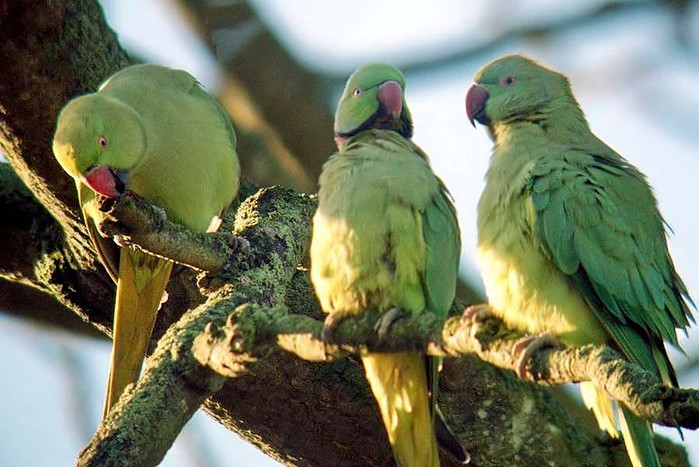Too Late to Stop Them? Parakeets Settle in Turkey’s Cities

Once rare and exotic, the raucous screeches of Rose-ringed Parakeets are now an increasingly familiar sound in the green spaces of Turkey’s cities. A new study by Erciyas-Yavuz and colleagues reveals that this striking, non-native parrot has not only established itself in multiple urban centres but is expanding—despite future projections of habitat loss driven by climate change.
Using roost counts, citizen science data, and sophisticated ecological niche models (ENMs), the researchers estimate Turkey’s Rose-ringed Parakeet population at around 6,000 individuals as of 2021, a near fivefold increase from 2015. While climate scenarios suggest a 50% reduction in suitable habitat by the end of the century, the study warns that coastal cities like Istanbul, Izmir and Antalya will remain strongholds, fuelling future spread.
Urban Invaders: Green Feathers, Red Flags
The Rose-ringed Parakeet (Psittacula krameri) is one of the world’s most successful avian invaders. Native to sub-Saharan Africa and the Indian subcontinent, it has found new homes across Europe and the Middle East, including urban areas where food and nesting opportunities are plentiful.
First recorded in Turkey in 1975, the parakeet now breeds in at least ten cities. Fieldwork from 2020–2021 confirmed roosts in Istanbul (up to 3,200 birds), Ankara, Izmir, and Sanliurfa, with citizen science reports extending its range to 37 provinces. This growth aligns with broader trends across Europe, where Rose-ringed Parakeets have boomed in city centres from London to Rome.
Climate May Constrain, but Cities Sustain
Ecological niche models project a shrinking of Turkey’s climatically suitable habitat for these birds, particularly in Central Anatolia. However, coastal zones and major cities are expected to retain favourable microclimates and year-round food sources from ornamental plantings and bird feeders. As such, urban environments may act as refuges—and springboards—for continued range expansion.
“Our model suggests that while climate change will reduce the total suitable habitat area, urban parakeet populations may persist or even grow,” the authors note. “This underscores the importance of early management in areas where the species is still incipient.”
Unmeasured Impacts and Management Gaps
Although admired by some for their vibrant colours and charisma, Rose-ringed Parakeets pose serious risks to native wildlife. In Europe, they have been linked to nest-site competition with woodpeckers, starlings, and bats, as well as damage to fruit crops and urban trees.
In Turkey, interactions with native species have been observed, but systematic studies of ecological and economic impacts are still lacking. The researchers urge the development of a national management strategy, including education campaigns, legal controls on trade and release, and targeted population control in key cities.
Lessons from Europe, Warnings for Turkey
Other countries have struggled to manage entrenched parakeet populations. In the UK and the Netherlands, culls and roost dispersal efforts have proven costly and controversial. By contrast, Turkey may still have a window for early action—particularly if climate constraints delay spread into new regions.
“The longer these populations remain unmanaged, the more difficult and expensive they will be to control,” the study concludes. “Our findings are a call to act—not just watch—before urban charm becomes ecological harm.”
3 Apr 2025
Share this story







